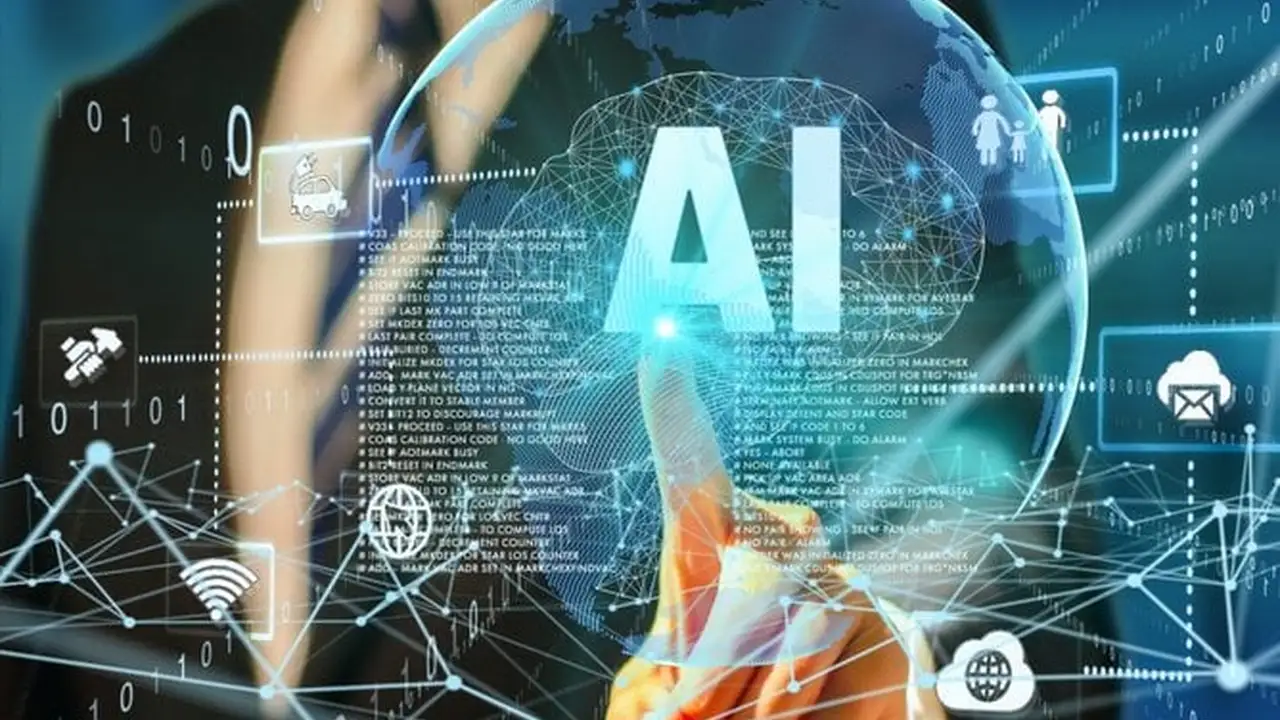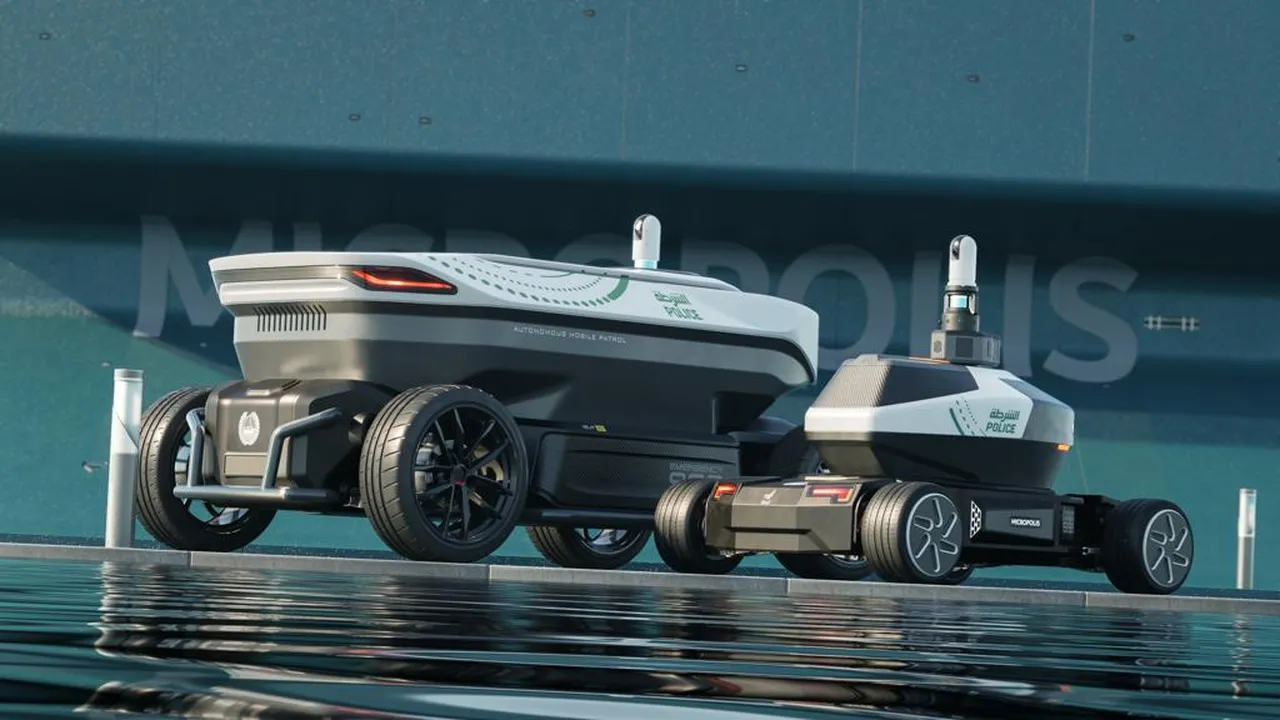7 Best AI Applications in UAE's Energy Sector

This article explores cutting-edge AI applications and smart city initiatives, delving into real-world examples, product recommendations, use cases, and detailed product comparisons with pricing information, all while maintaining a conversational tone.
The Rise of Artificial Intelligence in Smart Cities
The convergence of artificial intelligence (AI) and smart city initiatives is revolutionizing how we live, work, and interact with our urban environments. From optimizing traffic flow to enhancing public safety and improving energy efficiency, AI is becoming an indispensable tool for building more sustainable, resilient, and livable cities. This transformation isn't just a futuristic vision; it's happening right now, with cities around the globe implementing innovative AI-powered solutions to address a wide range of challenges.
Consider the sheer volume of data generated daily by urban populations. Sensors, cameras, mobile devices, and various IoT (Internet of Things) devices are constantly collecting information about everything from traffic patterns and air quality to energy consumption and public transportation usage. Without AI, making sense of this data deluge would be virtually impossible. AI algorithms can analyze vast datasets in real-time, identify patterns and trends, and provide actionable insights that enable city planners and policymakers to make more informed decisions.
But what exactly does AI bring to the table? It's not just about crunching numbers faster. AI empowers cities to:
* **Predict future events:** AI can forecast traffic congestion, predict crime hotspots, and anticipate infrastructure failures, allowing for proactive interventions. * **Automate routine tasks:** AI-powered systems can automate tasks such as traffic light control, waste management, and public transportation scheduling, freeing up human resources for more complex and strategic activities. * **Personalize services:** AI can tailor services to individual needs and preferences, such as providing personalized travel recommendations, optimizing energy consumption based on individual usage patterns, and delivering targeted public safety alerts. * **Improve decision-making:** AI can provide data-driven insights that help city leaders make better decisions about resource allocation, infrastructure development, and public policy.Smart Transportation Systems Powered by AI
One of the most visible applications of AI in smart cities is in the realm of transportation. AI-powered systems are being used to optimize traffic flow, reduce congestion, improve public transportation efficiency, and enhance road safety. Let's take a closer look at some specific examples:
AI Traffic Management Systems
Traditional traffic management systems rely on fixed schedules and pre-programmed rules. AI-powered systems, on the other hand, can dynamically adjust traffic light timings based on real-time traffic conditions. These systems use sensors and cameras to monitor traffic flow and then use AI algorithms to optimize traffic light cycles, reducing congestion and improving travel times. For example, the city of Pittsburgh has implemented an AI traffic management system that has reduced travel times by 25% and decreased vehicle emissions by 20%.
**Product Recommendation:** Consider using **Sidewalk Labs' Flow** for advanced traffic management. Flow is an AI-powered platform that optimizes traffic flow in real-time, using data from a variety of sources, including sensors, cameras, and connected vehicles.
**Use Case:** A city struggling with rush hour congestion can implement Flow to dynamically adjust traffic light timings, reducing bottlenecks and improving traffic flow.
**Product Comparison:** Flow competes with other traffic management systems like **PTV Vissim** and **Siemens Sitraffic Scala**. While Vissim is primarily a simulation tool and Scala is a more traditional traffic management system, Flow offers the advantage of real-time optimization using AI.
**Detailed Information (Pricing):** Pricing for Sidewalk Labs' Flow is typically based on a per-intersection or per-mile basis and requires a custom quote. Contact Sidewalk Labs for specific pricing information.
Autonomous Vehicles and Ride-Sharing
Autonomous vehicles (AVs) have the potential to revolutionize urban transportation. AI is the driving force behind AV technology, enabling vehicles to perceive their surroundings, navigate complex environments, and make real-time decisions. Ride-sharing services are also leveraging AI to optimize routing, match passengers with drivers, and predict demand.
**Product Recommendation:** Explore partnerships with companies like **Waymo** or **Cruise** for integrating autonomous vehicles into your city's transportation ecosystem.
**Use Case:** A city can pilot a fleet of autonomous shuttles in a designated area to provide on-demand transportation and reduce reliance on private vehicles.
**Product Comparison:** Waymo and Cruise are leading the development of autonomous vehicle technology, but other companies like **Tesla** and **Aurora** are also making significant progress. Waymo is known for its extensive testing and data collection, while Cruise is focused on developing fully autonomous vehicles for ride-hailing services.
**Detailed Information (Pricing):** Partnership agreements with autonomous vehicle companies are highly customized and often involve complex revenue sharing models. Contact Waymo, Cruise, or other providers directly for pricing and partnership details.
Smart Parking Solutions
Finding parking in congested urban areas can be a major headache. Smart parking solutions use sensors and AI to monitor parking availability and guide drivers to available spaces. These systems can also enable mobile payment for parking and provide real-time parking information to drivers through mobile apps.
**Product Recommendation:** Implement **ParkMobile** or **Passport Parking** for mobile parking payment and real-time parking availability information.
**Use Case:** A city can deploy sensors in parking spaces to detect occupancy and then use ParkMobile or Passport Parking to display real-time parking availability on a mobile app, reducing search times and improving traffic flow.
**Product Comparison:** ParkMobile and Passport Parking are both popular mobile parking payment apps, but they differ in terms of features and coverage. ParkMobile offers a wider range of features, including parking reservations and event parking, while Passport Parking is more focused on providing a simple and user-friendly mobile payment experience.
**Detailed Information (Pricing):** ParkMobile and Passport Parking typically charge a small transaction fee per parking session. Contact ParkMobile and Passport Parking for specific pricing details and partnership options.
AI Enhancing Public Safety and Security in Urban Environments
AI is also playing a crucial role in enhancing public safety and security in smart cities. From crime prediction to facial recognition and emergency response, AI-powered solutions are helping cities to create safer and more secure environments for their residents.
Predictive Policing
Predictive policing uses AI algorithms to analyze crime data and identify areas that are at high risk of crime. This allows law enforcement agencies to deploy resources more effectively and prevent crime before it happens. However, it's important to address concerns about bias and fairness when implementing predictive policing systems.
**Product Recommendation:** Explore **PredPol** or **ShotSpotter** for predictive policing and gunshot detection capabilities.
**Use Case:** A police department can use PredPol to identify areas that are at high risk of burglaries and then deploy patrols to those areas, deterring crime and improving public safety.
**Product Comparison:** PredPol is a predictive policing platform that uses AI to forecast crime hotspots, while ShotSpotter uses acoustic sensors to detect and locate gunshots in real-time. Both solutions can help law enforcement agencies to respond more effectively to crime.
**Detailed Information (Pricing):** Pricing for PredPol and ShotSpotter varies depending on the size of the city and the specific features required. Contact PredPol and ShotSpotter for specific pricing information.
Facial Recognition Technology
Facial recognition technology can be used to identify individuals in public spaces, helping to prevent crime, apprehend suspects, and locate missing persons. However, the use of facial recognition technology raises significant privacy concerns, and it's important to implement appropriate safeguards to protect individual liberties.
**Product Recommendation:** Consider **NEC NeoFace** or **Cognitec FaceVACS** for advanced facial recognition capabilities.
**Use Case:** A city can use facial recognition technology to identify known criminals in public places, deterring crime and improving public safety. The technology can also be used to locate missing persons or identify victims of crime.
**Product Comparison:** NEC NeoFace and Cognitec FaceVACS are both leading providers of facial recognition technology, but they differ in terms of accuracy, speed, and features. NEC NeoFace is known for its high accuracy, while Cognitec FaceVACS is more focused on providing a comprehensive suite of facial recognition tools.
**Detailed Information (Pricing):** Pricing for facial recognition technology varies depending on the number of cameras, the size of the city, and the specific features required. Contact NEC and Cognitec for specific pricing information.
AI-Powered Emergency Response Systems
AI can also be used to improve emergency response times and coordinate emergency services more effectively. AI-powered systems can analyze data from various sources, such as 911 calls, social media, and traffic cameras, to identify emergencies and dispatch the appropriate resources. These systems can also provide real-time information to first responders, helping them to make better decisions and save lives.
**Product Recommendation:** Investigate **RapidSOS** for improved emergency response coordination and data sharing.
**Use Case:** When a 911 call is placed, RapidSOS can automatically transmit the caller's location and other relevant information to first responders, reducing response times and improving the chances of a successful outcome.
**Product Comparison:** RapidSOS is a platform that integrates with existing 911 infrastructure to provide first responders with more accurate location data and other critical information. Other emergency response systems rely on traditional methods of data collection and transmission, which can be slower and less accurate.
**Detailed Information (Pricing):** Pricing for RapidSOS varies depending on the size of the city and the level of integration required. Contact RapidSOS for specific pricing information.
AI Optimizing Energy Efficiency and Sustainability in Smart Cities
Sustainability is a key priority for smart cities, and AI is playing a vital role in optimizing energy efficiency and reducing carbon emissions. From smart grids to energy-efficient buildings and waste management, AI-powered solutions are helping cities to become more environmentally friendly.
Smart Grids and Energy Management
Smart grids use AI to optimize energy distribution, reduce energy waste, and integrate renewable energy sources more effectively. AI algorithms can analyze energy consumption patterns and predict demand, allowing utilities to adjust energy supply accordingly. Smart grids can also enable consumers to monitor their energy usage and make informed decisions about how to conserve energy.
**Product Recommendation:** Consider using **Oracle Utilities Opower** or **Itron Riva** for smart grid and energy management solutions.
**Use Case:** A utility company can use Oracle Utilities Opower to provide customers with personalized energy consumption reports and recommendations, helping them to reduce their energy usage and save money.
**Product Comparison:** Oracle Utilities Opower and Itron Riva are both leading providers of smart grid and energy management solutions, but they differ in terms of features and functionality. Oracle Utilities Opower is more focused on providing customer engagement tools, while Itron Riva is more focused on providing advanced grid analytics.
**Detailed Information (Pricing):** Pricing for Oracle Utilities Opower and Itron Riva varies depending on the size of the utility and the specific features required. Contact Oracle and Itron for specific pricing information.
Energy-Efficient Buildings
AI can be used to optimize energy consumption in buildings by automatically adjusting lighting, heating, and cooling systems based on occupancy, weather conditions, and other factors. Smart buildings can also use AI to monitor energy usage and identify areas where energy can be saved.
**Product Recommendation:** Implement **Honeywell Forge** or **Siemens Building Technologies** for building automation and energy management.
**Use Case:** A building owner can use Honeywell Forge to automatically adjust the temperature and lighting in different areas of the building based on occupancy and weather conditions, reducing energy consumption and improving occupant comfort.
**Product Comparison:** Honeywell Forge and Siemens Building Technologies are both leading providers of building automation and energy management solutions, but they differ in terms of features and functionality. Honeywell Forge is more focused on providing cloud-based solutions, while Siemens Building Technologies offers a wider range of hardware and software options.
**Detailed Information (Pricing):** Pricing for Honeywell Forge and Siemens Building Technologies varies depending on the size of the building and the specific features required. Contact Honeywell and Siemens for specific pricing information.
Smart Waste Management
AI can be used to optimize waste collection routes, reduce waste volume, and improve recycling rates. Smart waste bins can use sensors to monitor fill levels and alert waste collection crews when they need to be emptied. AI-powered sorting systems can also be used to separate recyclable materials more efficiently.
**Product Recommendation:** Explore **Bigbelly** or **Sensoneo** for smart waste management solutions.
**Use Case:** A city can deploy Bigbelly smart waste bins in public areas to reduce the frequency of waste collection and improve the aesthetics of the city.
**Product Comparison:** Bigbelly and Sensoneo are both leading providers of smart waste management solutions, but they differ in terms of features and functionality. Bigbelly is more focused on providing compacting waste bins, while Sensoneo offers a wider range of sensors and software for waste management.
**Detailed Information (Pricing):** Pricing for Bigbelly and Sensoneo varies depending on the number of bins and the specific features required. Contact Bigbelly and Sensoneo for specific pricing information.
AI Improving Healthcare and Well-being in Urban Centers
AI is also transforming healthcare and improving the well-being of residents in smart cities. From remote patient monitoring to AI-powered diagnostics and personalized medicine, AI is helping to deliver more efficient, effective, and accessible healthcare services.
Remote Patient Monitoring
Remote patient monitoring uses AI to track patients' vital signs and other health data remotely, allowing healthcare providers to monitor their condition and intervene early if necessary. This can help to reduce hospital readmissions, improve patient outcomes, and lower healthcare costs.
**Product Recommendation:** Consider using **Philips CareSage** or **BioTelemetry** for remote patient monitoring solutions.
**Use Case:** A hospital can use Philips CareSage to monitor patients with chronic conditions remotely, allowing them to intervene early if the patient's condition deteriorates.
**Product Comparison:** Philips CareSage and BioTelemetry are both leading providers of remote patient monitoring solutions, but they differ in terms of features and functionality. Philips CareSage is more focused on providing predictive analytics, while BioTelemetry offers a wider range of monitoring devices.
**Detailed Information (Pricing):** Pricing for Philips CareSage and BioTelemetry varies depending on the number of patients and the specific features required. Contact Philips and BioTelemetry for specific pricing information.
AI-Powered Diagnostics
AI can be used to analyze medical images, such as X-rays and MRIs, to detect diseases and abnormalities more accurately and efficiently. AI-powered diagnostics can also help to personalize treatment plans based on individual patient characteristics.
**Product Recommendation:** Explore **IBM Watson Health Imaging** or **Arterys** for AI-powered diagnostic tools.
**Use Case:** A radiologist can use IBM Watson Health Imaging to analyze medical images and detect early signs of cancer, improving the chances of successful treatment.
**Product Comparison:** IBM Watson Health Imaging and Arterys are both leading providers of AI-powered diagnostic tools, but they differ in terms of features and functionality. IBM Watson Health Imaging offers a wider range of diagnostic capabilities, while Arterys is more focused on providing cloud-based solutions.
**Detailed Information (Pricing):** Pricing for IBM Watson Health Imaging and Arterys varies depending on the number of users and the specific features required. Contact IBM and Arterys for specific pricing information.
Personalized Medicine
AI can be used to analyze patients' genetic information and other data to personalize treatment plans and improve the effectiveness of medical interventions. Personalized medicine can help to reduce side effects, improve patient outcomes, and lower healthcare costs.
**Product Recommendation:** Investigate **Tempus** or **Foundation Medicine** for personalized medicine solutions.
**Use Case:** An oncologist can use Tempus to analyze a patient's tumor DNA and identify the most effective treatment options, improving the chances of a successful outcome.
**Product Comparison:** Tempus and Foundation Medicine are both leading providers of personalized medicine solutions, but they differ in terms of features and functionality. Tempus is more focused on providing comprehensive genomic profiling, while Foundation Medicine offers a wider range of diagnostic tests.
**Detailed Information (Pricing):** Pricing for Tempus and Foundation Medicine varies depending on the type of test and the specific services required. Contact Tempus and Foundation Medicine for specific pricing information.
Challenges and Considerations for AI Implementation in Smart Cities
While AI offers tremendous potential for transforming urban landscapes, it's important to acknowledge the challenges and considerations associated with its implementation. These include:
* **Data Privacy and Security:** Protecting sensitive data is paramount. Robust security measures and data anonymization techniques are crucial to prevent breaches and ensure privacy. * **Bias and Fairness:** AI algorithms can perpetuate existing biases in data, leading to unfair or discriminatory outcomes. It's essential to carefully evaluate and mitigate bias in AI systems. * **Job Displacement:** Automation driven by AI may lead to job displacement in certain sectors. Cities need to proactively address this issue through retraining and workforce development programs. * **Ethical Considerations:** The use of AI raises ethical questions about accountability, transparency, and autonomy. Clear ethical guidelines and regulations are needed to ensure responsible AI development and deployment. * **Infrastructure Requirements:** AI applications often require significant infrastructure investments, including high-speed internet, data centers, and sensors. Cities need to ensure that they have the necessary infrastructure to support AI adoption. * **Public Acceptance:** Gaining public trust and acceptance is essential for the successful implementation of AI in smart cities. Cities need to engage with residents and address their concerns about AI.The Future of AI and Smart City Development
The future of AI and smart city development is bright. As AI technology continues to advance, we can expect to see even more innovative and transformative applications in urban environments. From personalized education and healthcare to autonomous transportation and sustainable energy systems, AI has the potential to create cities that are more livable, sustainable, and equitable for all.
The key to unlocking this potential lies in collaboration and innovation. Cities need to work with technology companies, research institutions, and the public to develop and deploy AI solutions that address their specific challenges and needs. By embracing a collaborative and forward-thinking approach, cities can harness the power of AI to create a better future for their residents.
So, what's next? Expect to see more sophisticated AI algorithms, more widespread adoption of IoT devices, and a greater emphasis on data-driven decision-making. The smart city of tomorrow will be a truly intelligent and responsive environment, adapting to the needs of its citizens in real-time. The journey has just begun, and the possibilities are endless.
:max_bytes(150000):strip_icc()/277019-baked-pork-chops-with-cream-of-mushroom-soup-DDMFS-beauty-4x3-BG-7505-5762b731cf30447d9cbbbbbf387beafa.jpg)






